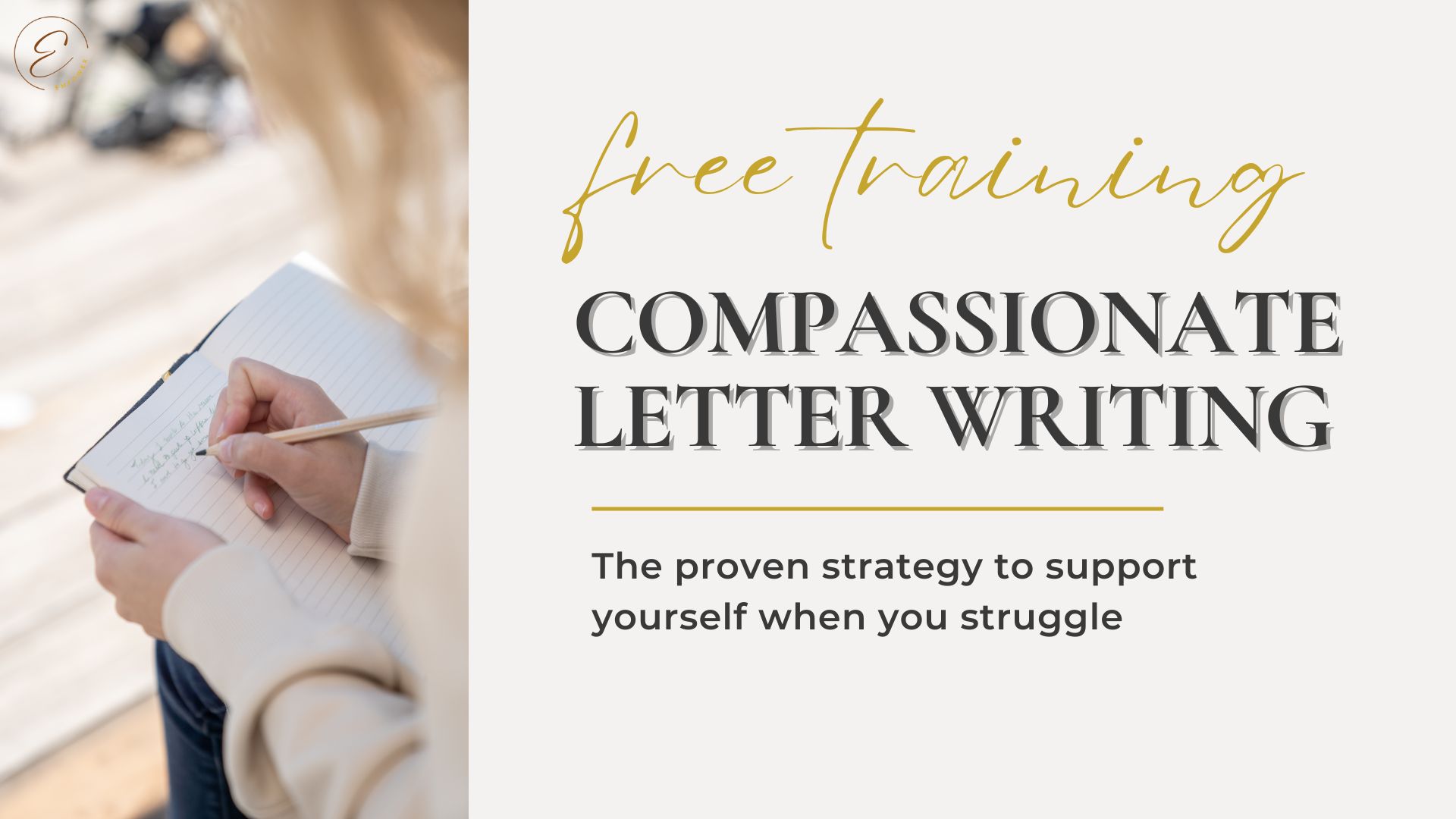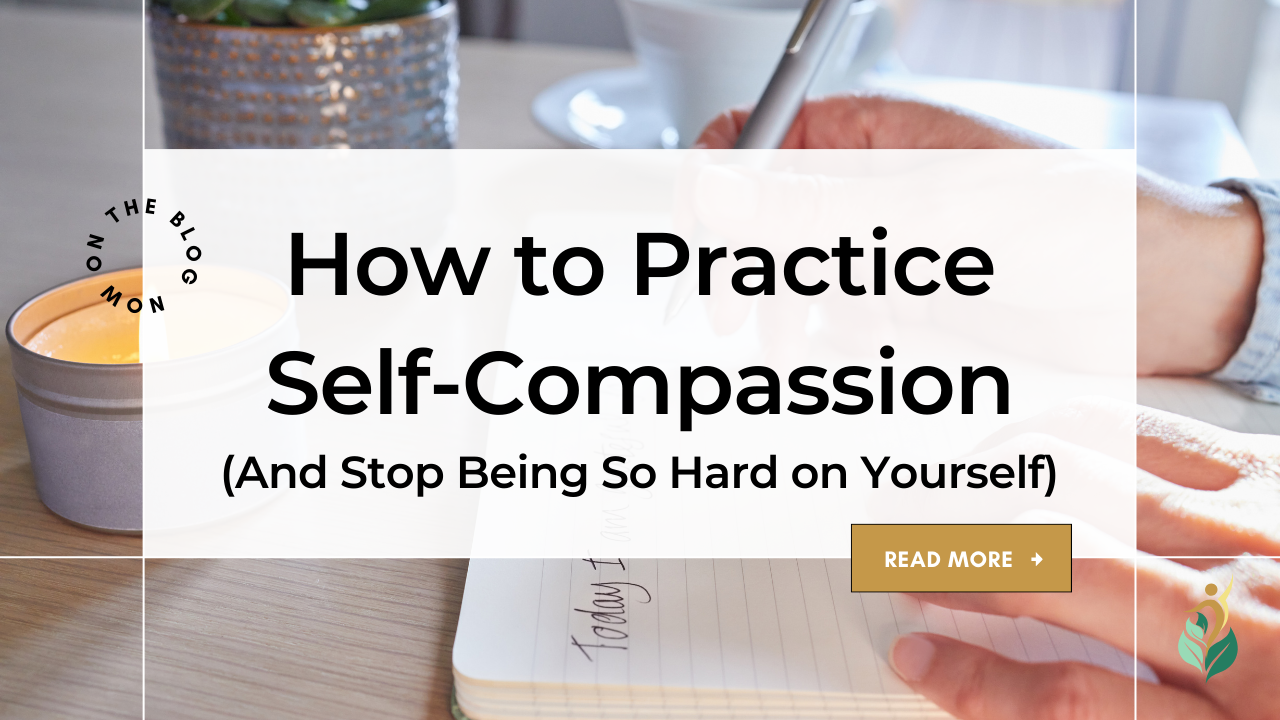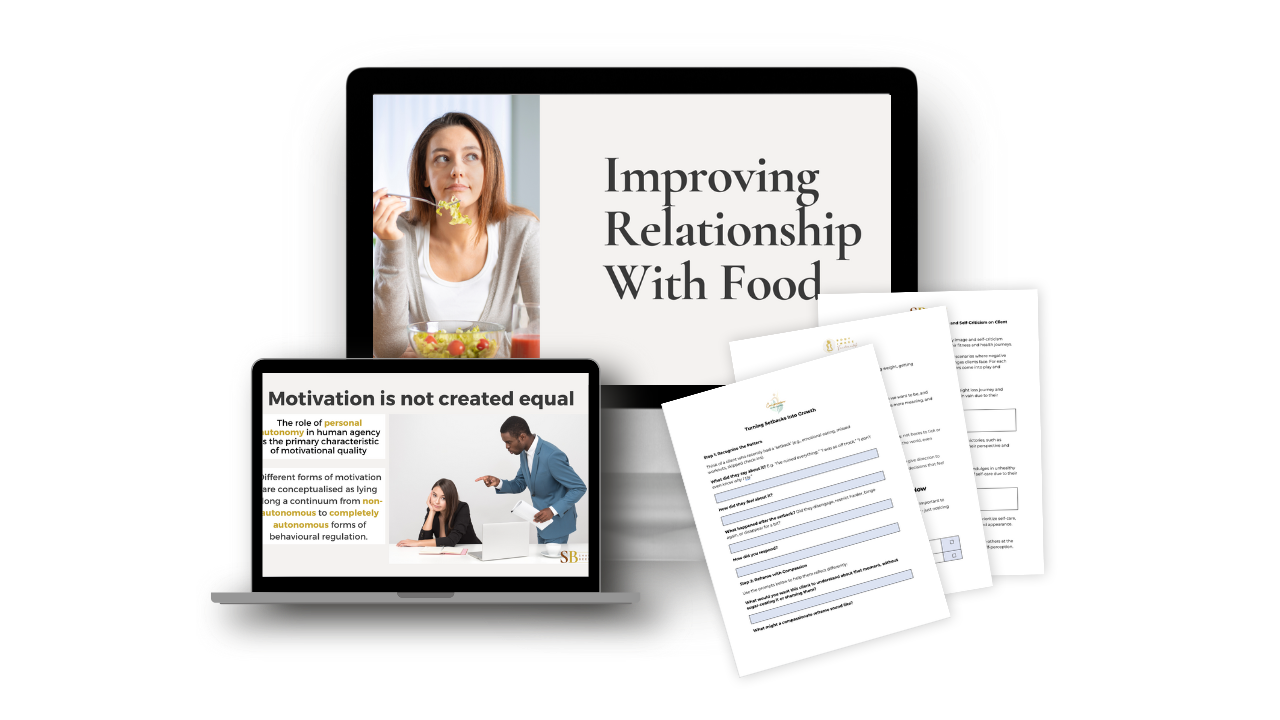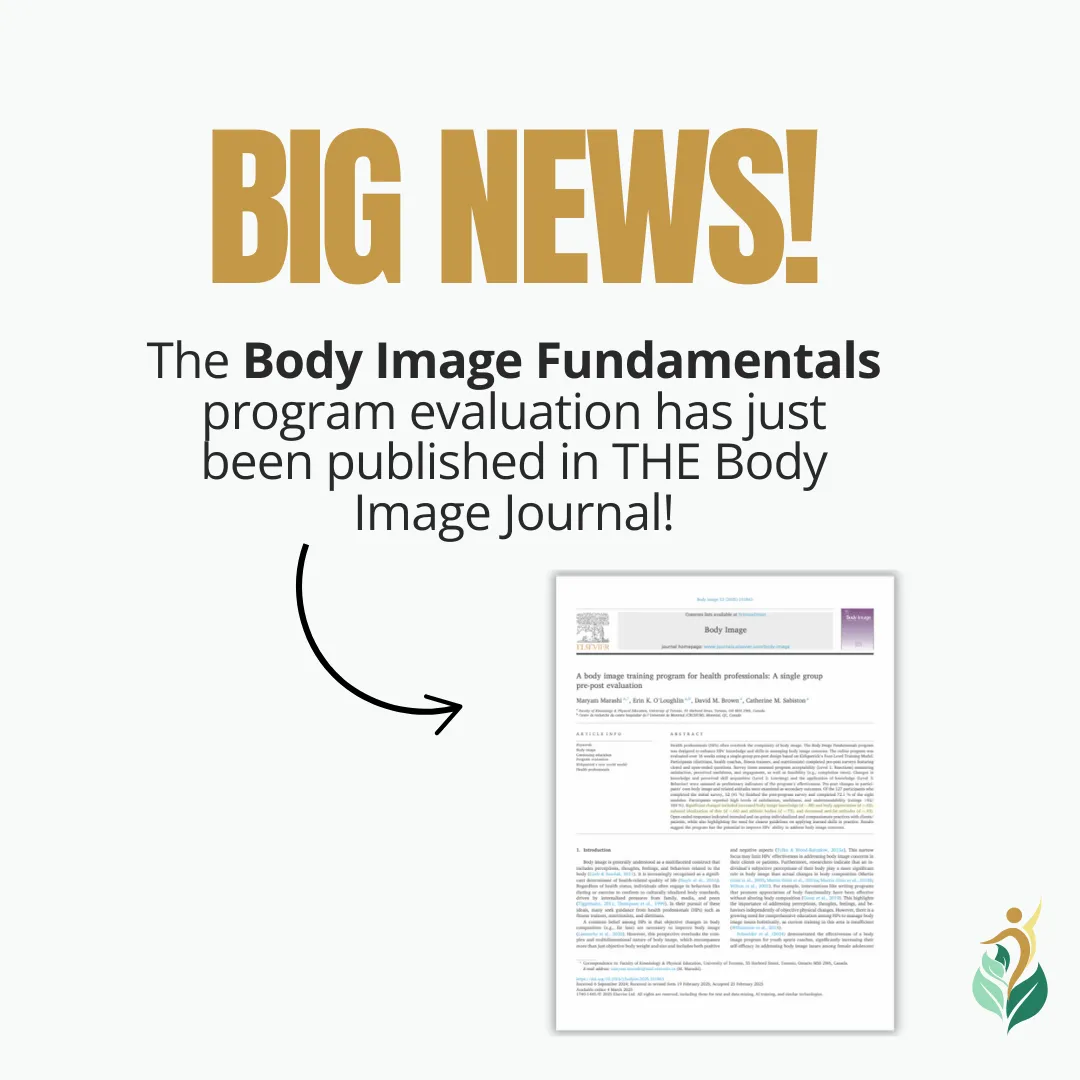How Self Compassion Exercises Can Transform Your Health and Fitness
Jul 27, 2023
Are you tired of obsessing over what to eat and fixating on your body weight? I’m guessing you’re pretty hard on yourself when you make unsatisfying food choices, which only makes it harder for you to change. If so, it's time to shift your focus from punishing and restricting yourself to strengthening your ability to self-regulate by cultivating self-compassion. In this article, I will explore how self-compassion exercises can help you manage emotional eating, recover from setbacks, and improve body image for lasting results.
Discover how:
- Cultivating self-compassion helps manage stress and develop healthier coping mechanisms, reducing the tendency to turn to food for comfort during difficult times.
- Self-compassion fosters a positive relationship with one's body and reduces negative thoughts about appearance, leading to improved body image.
- Self-compassion enhances self-regulation, the ability to control responses and direct behaviour toward health and fitness goals.
- When facing setbacks or perceived failures, self-compassion promotes productive self-reflection and growth, rather than self-blame or denial.
- Clients experience transformative effects, such as improved body appreciation and reduced emotional eating, leading to lasting results.
But before we get into it, let's start with a few words on ‘discipline’...
What We Get Wrong About Discipline
We’re often told that we need to be disciplined in order to improve our diet or be consistent with exercise. You may think that discipline means being perfect all the time, and if you slip up once, you’ve failed. You may view discipline as a form of punishment, where you have to sacrifice enjoyment or pleasure to achieve your health and fitness goals. Worst of all, you may think that being disciplined requires constant self-criticism and negative self-talk. The irony is that this makes it harder to be disciplined, as it just leads to a harmful cycle of self-sabotage that is difficult to break out of.
By the way, did you know discipline isn’t even a scientific term?
Despite this fact, much of the messaging in the fitness industry leads us to believe that if we just ‘grind harder’, we’ll magically develop the willpower we need to achieve our goals.
You’ve already tried that and you know it doesn’t work.
Here’s What You’ve Been Missing
Blindly telling yourself to ‘try harder’ is a great way to repeat the same cycles and ultimately perpetuate your struggle. To achieve your health and nutrition goals, what you really need is the ability to self-regulate.
Self-regulation is essentially our ability to control our responses, so that we can direct our behaviour towards our goals [1]. This involves our ability to regulate our emotions, thoughts and actions. You develop this by learning different micro skills, which all start with a foundation of self-compassion.
The Importance of Self-Compassion in Health and Fitness
Self-compassion is often overlooked when it comes to health and fitness, but it is a crucial element in achieving long-term success. Research finds that self-compassion can be a useful way to enhance self-regulation in ways that promote health [2]. Self-compassion is also a far more effective motivator than self-criticism and harsh self-judgement [3]. When you treat yourself with care and respect, you are more likely to stick to your health and fitness goals and make choices that support your well-being [4].
A compassionate approach to achieving your nutrition goals starts with understanding why you make the choices you do and how certain eating behaviours may develop as a way to provide relief or distraction from difficult emotions [5]. Through an increased understanding of how your body operates (much of which is outside of your control), you can develop a compassionate understanding and acceptance of your body as well as its need for nutrition, activity, and rest. Far from letting yourself go, self-compassion is actually about supporting your health [6].
Self-Compassion Exercises for Managing Emotional Eating
Self-compassion exercises can help us manage stress and develop healthier coping mechanisms, rather than turning to food when we’re having a hard time.
One powerful exercise is Soothing Rhythm Breathing. When we are in threat mode, our sympathetic nervous system is active. We need to stimulate the opposing force of the parasympathetic nervous system to calm our body and mind. Slow breathing is our key to slowing down the body and mind and kick starting the parasympathetic nervous system.
Take a few moments to focus on your breath and bring awareness to any stress or tension in your body. Here’s how it works:
Step 1: Ensure that you are sitting in a comfortable chair or laying on a bed
Step 2: Take a breath in for 4 seconds (through the nose if possible)
Step 3: Hold the breath for 2 seconds
Step 4: Release the breath for 6 seconds (again through the nose if possible)
Step 5: Pause slightly before breathing in again
Step 6: Then practice, practice, practice!
You can try a guided version of the exercise HERE.
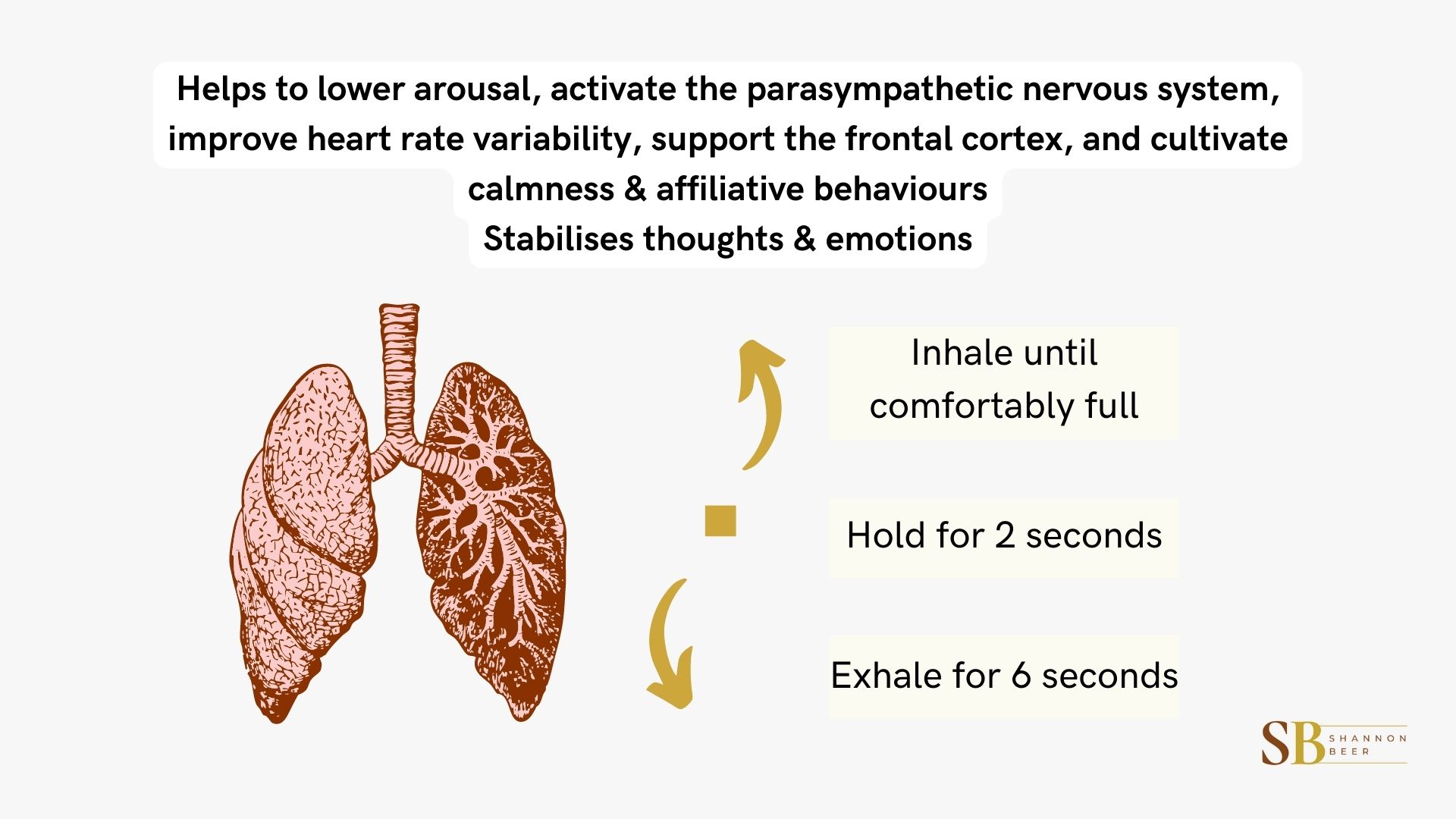
Initially practice at a time when you can relax, relatively free from distraction. As you improve at the skill of slow breathing, you might then choose to practise whenever you have a spare moment (like waiting in a shopping queue, on your lunch break etc). Ultimately we want to build the habit of being able to use your breath to activate a calming physical state when you’re having a hard time. This will put you in the best position possible to self-regulate rather than being at the whim of difficult emotions.
Another effective exercise is to take a moment of Self C.A.R.E. When you find yourself reaching for food to cope with stress or emotions, pause for a moment and ask yourself what you truly need in that moment. Practice self-compassion by offering yourself alternative ways to soothe and nurture yourself, such as taking a walk, journaling, or calling a supportive friend.
You can follow a guided audio practice HERE.
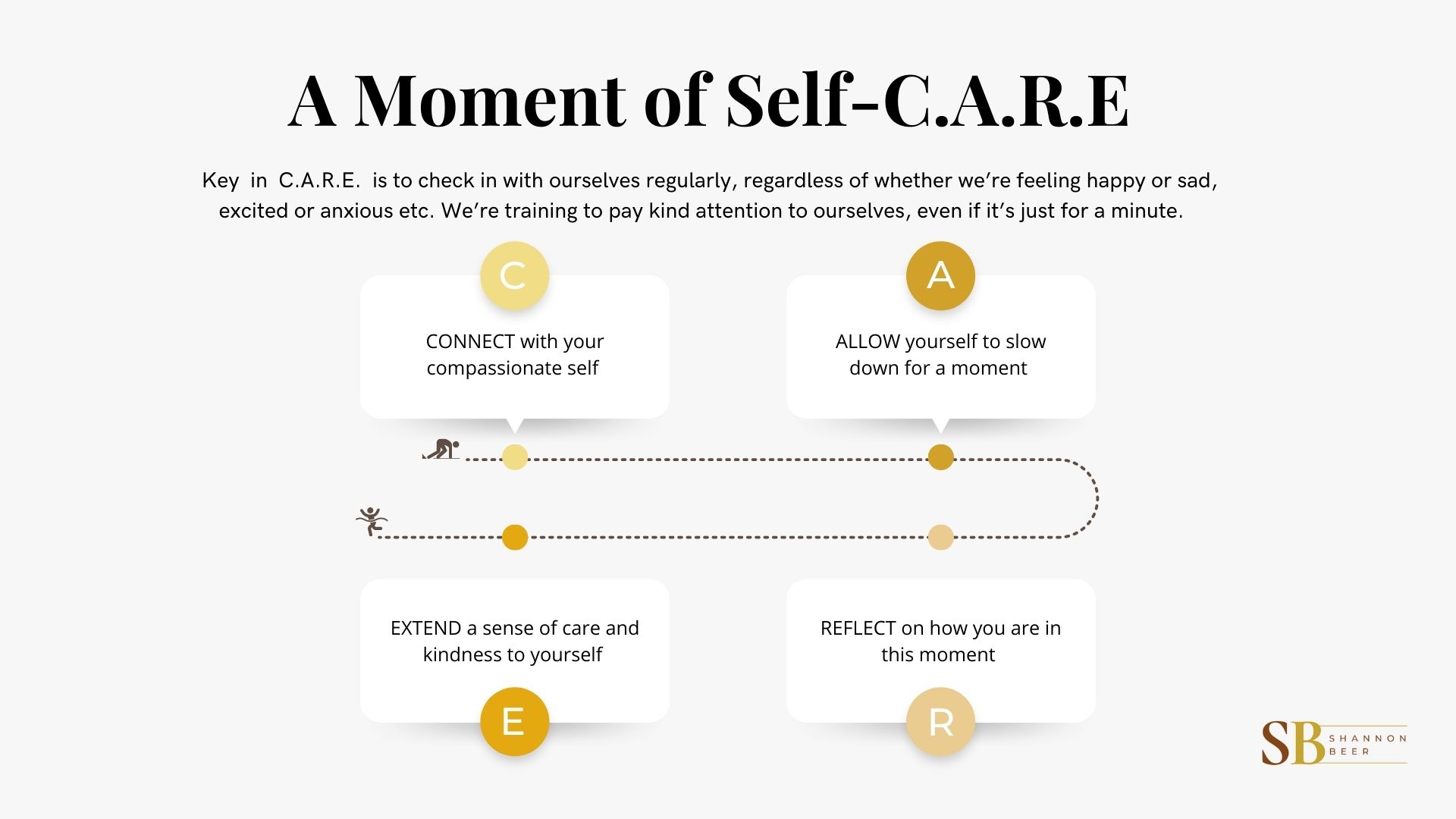
Self-Compassion Exercises for Recovering From Setbacks
No health and fitness journey is without setbacks and challenges. Perceived eating transgressions are common and upsetting, and can prompt further instances of unhealthy eating [7]. When we feel like we’ve failed, we typically ruminate and criticise ourselves rather than taking productive action [8]. This is where self-compassion makes all the difference.
When faced with a setback, it's important to practise self-compassion rather than blaming yourself or pretending that nothing happened. Engaging in compassionate self-reflection can reduce emotional reactivity and increase insight, particularly when it involves re-construing and understanding a scenario from a broader perspective [9]. Not only does this stop us from self-sabotaging, but it helps us to move forward and do something differently next time. With self-compassion, our setbacks become opportunities for growth and learning.
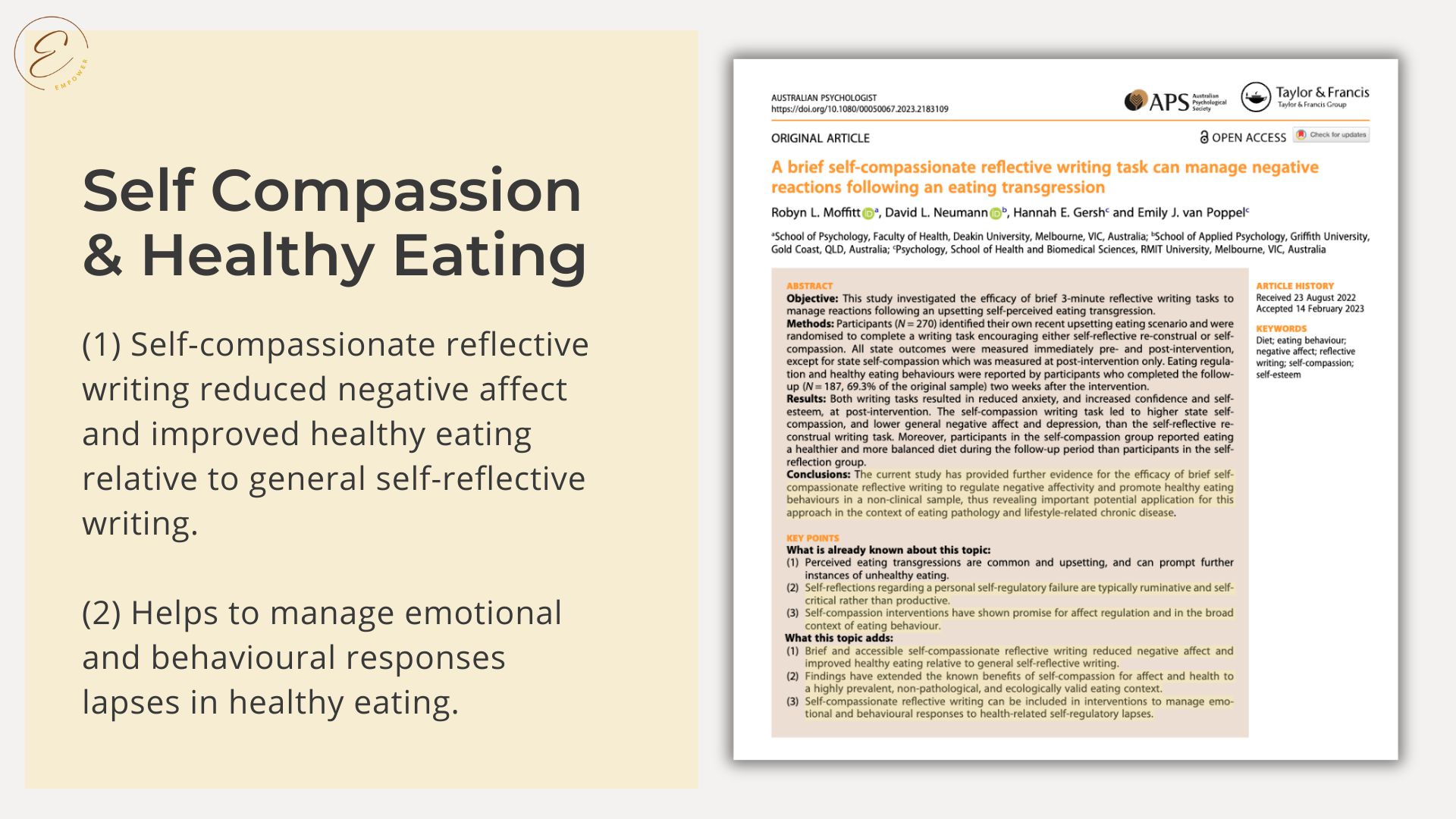
You can download a free, guided Compassionate Letter Writing exercise HERE to help you show yourself understanding, support and encouragement.
Another effective practice is self-compassionate support-seeking. Reach out to trusted friends, family members, or a professional for support and guidance when you’re having a hard time. Surround yourself with a supportive network to buffer stress and receive encouragement as you navigate setbacks and challenges.
Self-Compassion Exercises for Improving Body Image
One area where self-compassion can have a profound impact is in improving body image [10]. Alongside many other people, you may struggle with negative thoughts about your appearance and tying too much of your self-worth to how you look. If you feel dissatisfied with your body, self-compassion exercises can help you to create a more accepting, positive view of your body.
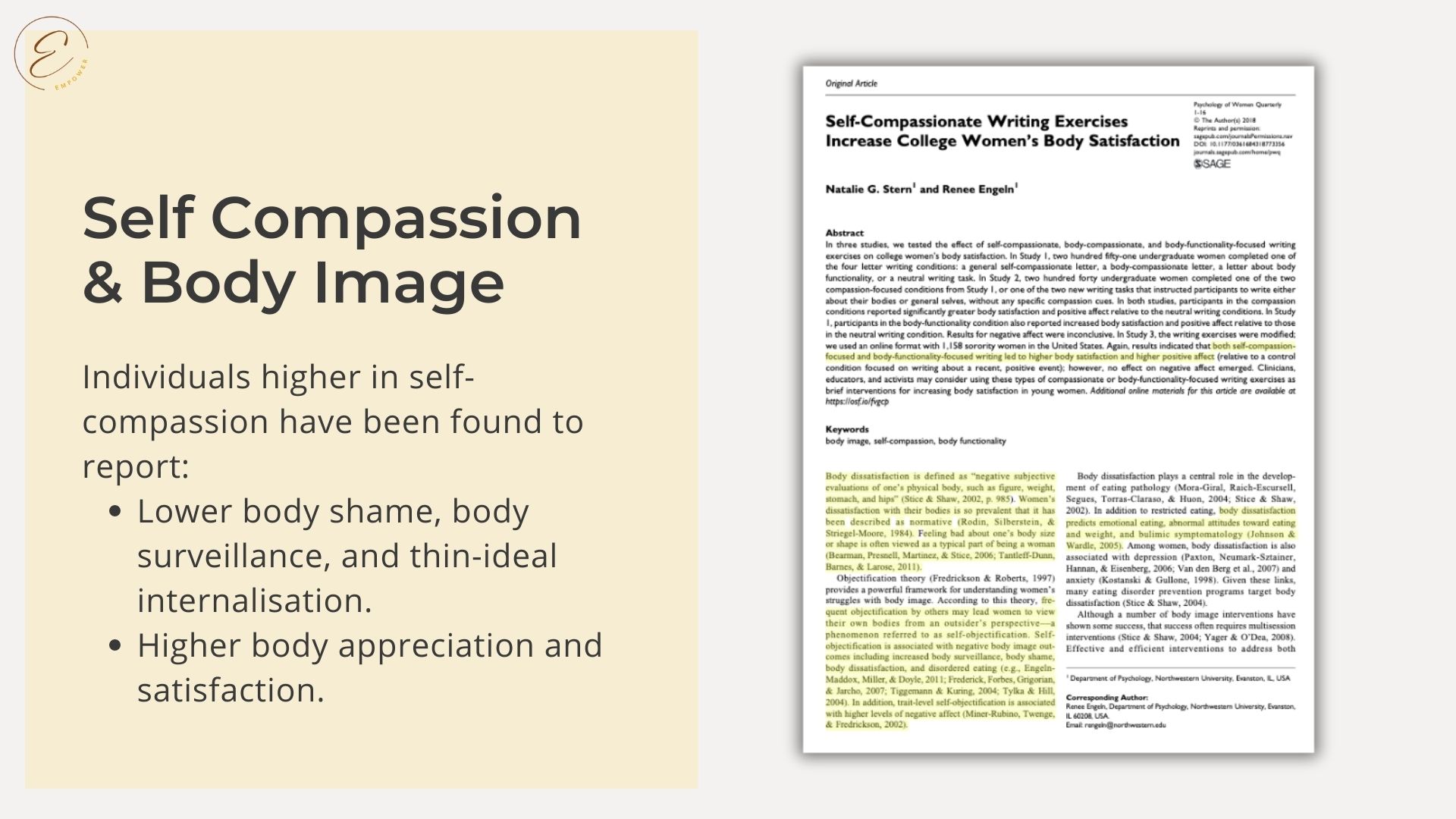
A powerful self-compassion exercise for improving body image is, once again, compassionate letter writing. Try the free guided training - click the image below to get started.
Whilst you are writing, you may want to also practise body appreciation. List all of the things that you appreciate about your body and reflect on the functions it performs. This could include:
- Senses: Sights, music, food
- Self Care: Sleeping, showering, cooking, eating
- Communication with others: Talking, cuddling, sex, laughing, kissing, being a shoulder to cry on
- Physical capacities: Walking, stretching, yoga, sports, strength, balance
- Creative endeavours: Drawing, singing, writing, reading, dancing, photograph
- Health: Healing from illness, growing, breathing
Practice gratitude for your body’s strength, resilience, and the pleasure it brings you. This can help you to treat your body with care by engaging in activities that promote health and well-being, rather than punishing it through restrictive diets or excessive exercise.
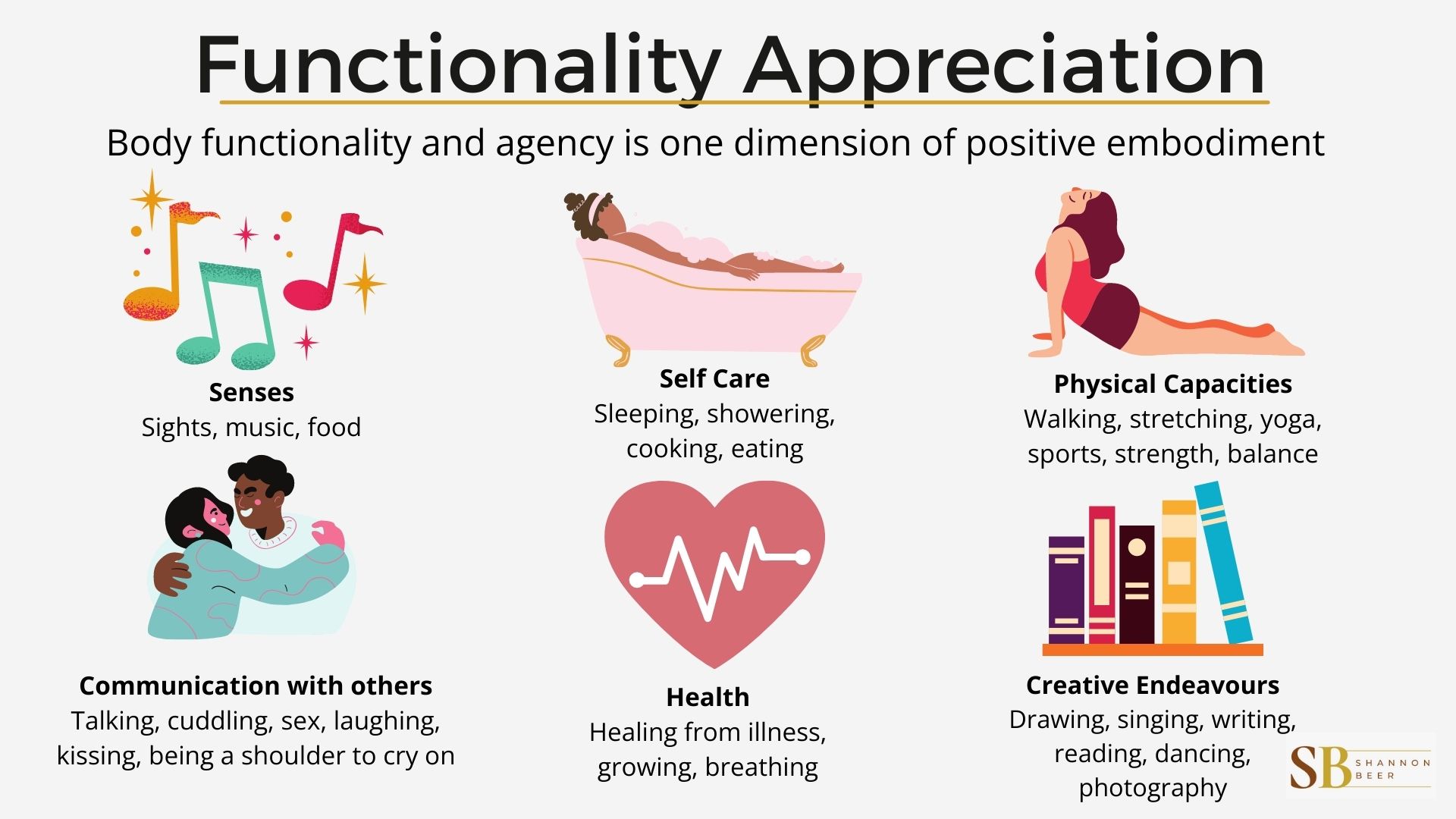
Real Life Benefits
Let me tell you, all of my clients are skeptical about developing compassion to begin with. We care deeply about our goals and we want to do everything it takes to achieve them, so it’s no wonder we fall prey to societal narratives of punishment and discipline. And yet, when clients realise just how self-compassion can help, everything clicks.
Take Caity, who was struggling to support herself once she had retired from being a professional athlete. ‘Working with Shannon helped me to see I was still worthy to eat good food and take care of myself and my body, even if I was not physically demanding it to perform. I could see how eating well was about showing myself love and care. I am able to be more compassionate to myself and alot more self aware. When I am reaching for food for comfort, I still practise asking myself questions of how I am feeling and what I really need’.
Or Lorryn, who was struggling with binge eating and body shame when we first began working together. ‘Coaching changed my life. I learned vocabulary around emotions, their physical sensations and it helped me to start building other coping mechanisms which reduced the longevity of binges at first and then the amount of food. It also equipped me to figure out what I define as health and what values do I want to strive towards that would make ME happy and not just because I think this is something that I *must* achieve. But I think what was most life-changing for me was learning how to separate myself as a person from my body and appearance. I slowly learned how to respect myself and then went on to loving myself.’
Developing compassion has been the missing piece for many of my clients’ health and fitness journeys. If you want to overcome binge eating behaviours and feel comfortable in your body, check out the options we have for you at EMPOWER Coaching.
Conclusion
Cultivating self-compassion is a transformative journey that can revolutionise your health and fitness goals. By shifting your focus from punishment to nurturing, you can treat yourself the way you deserve and support your body in a sustainable way. If you constantly feel like you’re self-sabotaging, try embracing self-compassion. The exercises in this article are proven to help you improve your body image, develop a more helpful mindset, manage emotional eating, and overcome setbacks. With self-compassion as the foundation, you can create a sustainable and fulfilling approach to health and fitness that leaves you feeling free, mentally strong and happy in your body.
References
[1] Baumeister, R. F., Heatherton, T. F., & Tice, D. M. (1994). Losing control: How and why people fail at self-regulation. San Diego: Academic.
[2] Terry, M. L., & Leary, M. R. (2011). Self-compassion, self-regulation, and health. Self and Identity, 10(3), 352–362. https://doi.org/10.1080/15298868.2011.558404
[3] Breines, J. G., & Chen, S. (2012). Self-compassion increases self-improvement motivation. Personality & social psychology bulletin, 38(9), 1133–1143. https://doi.org/10.1177/0146167212445599
[4] Duarte, C., Gilbert, P., Stalker, C., Catarino, F., Basran, J., Scott, S., Horgan, G., & Stubbs, R. J. (2021). Effect of adding a compassion-focused intervention on emotion, eating and weight outcomes in a commercial weight management programme. Journal of health psychology, 26(10), 1700–1715. https://doi.org/10.1177/1359105319890019
[5] Steindl, S. R., Buchanan, K., Goss, K., & Allan, S. (2017). Compassion focused therapy for eating disorders: A qualitative review and recommendations for further applications. Clinical Psychologist, 21(2), 62–73. https://doi.org/10.1111/cp.12126
[6] Brenton-Peters J, Consedine NS, Boggiss A, Wallace-Boyd K, Roy R, Serlachius A. Self-compassion in weight management: a systematic review. J Psychosom Res. 2021;150:110617. doi:10.1016/j.jpsychores.2021.110617
[7] Forman, E. M., Schumacher, L. M., Crosby, R., Manasse, S. M., Goldstein, S. P., Butryn, M. L., Wyckoff, E. P., & Thomas, J. G. (2017). Ecological momentary assessment of dietary lapses across behavioural weight loss treatment: Characteristics, predictors, and relationships with weight change. Annals of Behavioural Medicine, 51(5), 741–753. https://doi.org/10.1007/s12160-017-9897-x
[8] Guertin, C., Barbeau, K., & Pelletier, L. (2018). Examining fat talk and self-compassion as distinct motivational processes in women’s eating regulation: A self-determination theory perspective. Journal of Health Psychology, 25(12), 1–13. https://doi.org/10.1177/1359105318781943
[9] Li, Y., Deng, J., Lou, X., Wang, H., & Wang, Y. (2020). A daily diary study of the relationships among daily self-compassion, perceived stress and health-promoting behaviours. International Journal of Psychology, 55(3), 364–372. https://doi.org/10.1002/ijop.12610
[10] Braun, T. D., Park, C. L., & Gorin, A. (2016). Self-compassion, body image, and disordered eating: A review of the literature. Body Image, 17, 117–131. https://doi.org/10.1016/j.bodyim.2016.03.003

Stuck In All Or Nothing Mode?
Your mind isn’t broken; it’s just running on autopilot.
Take the free Emotion System Audit and learn what's driving your patterns - and what to do when you feel overwhelmed or out of control.

